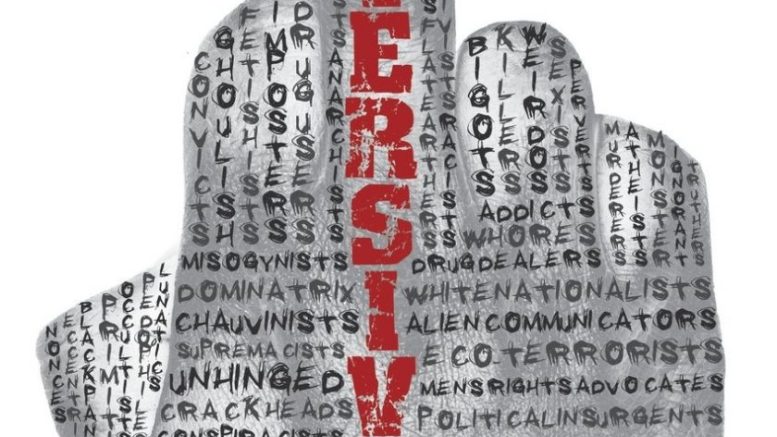As Brian Whitney points out in his introduction to this book, “subversive” is usually thought of as a political term, referring to someone seeking to “subvert” existing political and government systems. However, Whitney didn’t go into this project with that in mind.
“These were the questions I wanted to ask. I wanted to find people all over the world who had done things or are actively doing things that society thinks are oh so wrong, and I wanted to know why they didn’t care.”
However, finding that only a few people who fit those parameters were willing to talk to him, he expanded his search to people seeking to subvert not only societal norms, but political, artistic, and sexual ones as well. As a result, this book features interviews with political radicals, from Black Panthers to white nationalists to anarchists, pornographers, convicted murderers, conspiracy theorists, and strange artists.
There are times in this book where it’s very clear that the person Whitney is talking to is a critical case. The one that stands out the most is with author and literary fraudster Tim Barrus. Barrus, a white man, wrote phony memoirs under the name “Nasdijj” pretending to be a Native American which garnered critical acclaim and awards until he was exposed. Rather than answer any of the questions Whitney sent him, Barrus just sent a rant against the literary establishment and humanity in general. It has to be read to be believed.
In a somewhat similar vein is the interview with the self-proclaimed futurist Alfred Webre. Webre specializes in what he calls “exopolitics,” that is, politics as it relates to extraterrestrial phenomena. While he answers Whitney’s questions, I couldn’t tell you what the man really believes. His answers read to me like pseudo-scientific babble. Webre may be an interesting character, but he seems the type more interesting to read about than to hear from directly.
Then there’s Eric Dubay. This is a man who seems to believe in every conspiracy theory under the sun. As Whitney probes him, he seems to become more and more unhinged. He believes in a flat Earth, yet he dismisses other flat Earthers as “controlled opposition.” When Whitney asks him about his views on Holocaust denial, Dubay not only endorses it, but goes into a hateful screed about “International Jewry.” He seems like such a stereotypical loon that it’s surprising Whitney didn’t just make him up.
That’s not to say most of the interviews are the literary equivalent of a freak show. Figures like the former Black Panther Jamal Joseph, anarchist Keith Preston, and antinatalist philosopher David Benatar all articulate their viewpoints clearly. One may find their views dangerous or repulsive, but Whitney allows them to lay those views out for the reader to engage with directly, avoiding excessive editorializing.
Whitney avoiding passing judgment will likely rub people the wrong way in his interviews with white nationalists Jared Taylor and Jeff Schoep. This would probably be especially true of the interview with Nick Devin, who is probably the most controversial figure in the book. Devin is the founder of Virtuous Pedophiles, an online support group for people who are sexually attracted to children, yet don’t want to act on their desires. I give Whitney a lot credit for including people he knew could cause genuine controversy.
There are a few interviews that fell flat for me. The one with Mike Scott, lead singer of the punk band Lay it on the Line, is about his membership in the Process Church of the Final Judgment. However, I came away from the interview with little insight into either the Church or his relationship with it. Likewise, the interview with Socialist Party USA candidate for president Mimi Soltysik gave me little to chew on in regards to the party’s platform or his own personal views. In a book of 52 interviews, however, these few didn’t detract from the overall book.
This may seem like a nitpick, but one complaint I have is with the way the book is designed. Instead of a table of contents at the beginning, the interviewees and the page their interview is on is in the back in an index. Not only that, but they’re listed in alphabetical order by their first name. This is a baffling choice that made going back to find the ones I wanted to re-read much more difficult than it needed to be.
Review copy provided
Some of the coverage you find on Cultured Vultures contains affiliate links, which provide us with small commissions based on purchases made from visiting our site.

